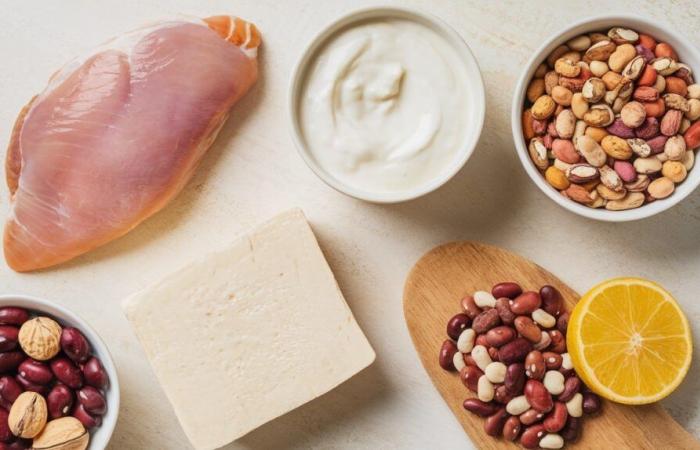Are you undergoing treatment to lose weight? A dietician reveals the 5 best sources of protein to preserve your muscles and optimize your weight loss. Quickly discover his recommendations for adapting your diet!
When taking medication to lose weight, such as GLP-1 medications, it is crucial to pay particular attention to your protein intake. Indeed, during weight loss, loss of muscle mass is common, and proteins are the building blocks of muscles. Fortunately, there are plenty of tasty foods to meet our needs without resorting to protein shakes all day. Here are the 5 best sources of lean protein to include in your diet to keep your muscles and optimize your weight loss during weight loss treatment.
Lean Poultry
Chicken and turkey are affordable and very accessible sources of lean protein. To limit saturated fats, choose skinless cuts and white meat such as breasts. And to save preparation time, opt for boneless cuts. 100g of skinless chicken breast provides around 31g of protein for only 165 calories. The same amount of turkey breast provides 25g of protein for 115 calories. These meats are also excellent sources of iron and vitamin B12, essential nutrients for energy. Poultry is easily prepared as a main course, in salads, soups, gratins, etc.
Low-fat Dairy Products
Milk, yoghurts and 0% or 20% fat white cheeses are other interesting sources of protein which promote satiety. A large glass of semi-skimmed milk provides 8g of protein per 100 calories. Greek yogurt contains around 15g of protein in a small individual pot. As for cottage cheese, count on 12g of protein per 100g in the low-fat version. Dairy products are also rich in calcium and vitamin D which contribute to bone health and good muscle function. Consider incorporating yogurt or milk into your sweet and savory recipes: porridge, smoothies, sauces, etc. Plain white cheese with aromatics also makes a tasty protein snack.
Soy and Derivatives
Tofu, tempeh and edamame are versatile plant-based proteins that can be used in a multitude of recipes. 100g of firm tofu provides 11g of protein, while the same amount of tempeh provides 20g. A serving of edamame contains around 12g of protein. Namely, tempeh is a fermented food made from soy beans compacted with whole grains, most often brown rice. It is distinguished by a nutty flavor and firm texture. To be enjoyed in a wok, as a plant-based burger or even as a mixed salad!
Legumes
Red beans, white beans, chickpeas… Legumes are full of protein and fiber which promote satiety and help you last until the next meal. If their protein content varies, we can expect around 7g of protein per 100g of cooked legumes on average. You can use them to make veggie burgers, chili, slide them into tacos or spread them in wraps. Legumes also make it possible to make express quesadillas, a nourishing and delicious snack!
Oilseeds
Nuts, almonds, pistachios… Oilseeds are concentrated in vegetable proteins and beneficial unsaturated lipids which provide a satiating effect. With 6 to 7g of protein per approximately 30g, pistachios, almonds and peanuts are the most protein-rich. Oilseeds bring crunch and deliciousness to a porridge or salad. Their purees also make it possible to make delicious protein pastries or healthy snacks like energy balls. Prefer 100% nut oilseed purees, without added sugars or oils.
In Summary
Maintaining muscle mass is essential when following drug treatment to lose weight. Consuming enough protein helps the body preserve this lean tissue, especially when appetite is reduced. Poultry, low-fat dairy products, soy-based foods, legumes and oilseeds are excellent sources of lean and versatile proteins to include in your menus to meet your needs and optimize your weight loss with complete peace of mind.






